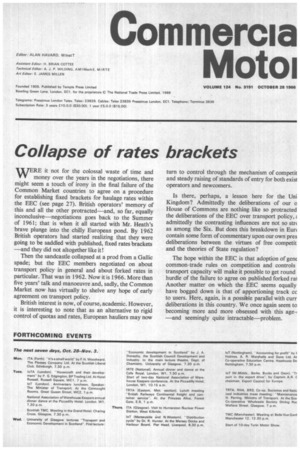Collapse of rates brackets
Page 19

If you've noticed an error in this article please click here to report it so we can fix it.
WERE it not for the colossal waste of time and money over the years in the negotiations, there might seem a touch of irony in the final failure of the Common Market countries to agree on a procedure for establishing fixed brackets for haulage rates within the EEC (see page 27). British operators' memory of this and all the other protracted—and, so far, equally inconclusive—negotiations goes back to the Summer of 1961; that is when it all started with Mr. Heath's brave plunge into the chilly European pond. By 1962 British operators had started realizing that they were going to be saddled with published, fixed rates brackets —and they did not altogether like it !
Then the sandcastle collapsed at a prod from a Gallic spade; but the EEC members negotiated on about transport policy in general and about forked rates in particular. That was in 1962. Now it is 1966. More than five years' talk and manoeuvre and, sadly, the Common Market now has virtually to shelve any hope of early agreement on transport policy.
British interest is now, of course, academic. However, it is interesting to note that as an alternative to rigid control of quotas and rates, European hauliers may now turn to control through the mechanism of corn petit and steady raising of standards of entry for both exist operators and newcomers.
Is there, perhaps, a lesson here for the Uni Kingdom? Admittedly the deliberations of our o House of Commons are nothing like so protracted the deliberations of the EEC over transport policy, z admittedly the contrasting influences are not so str( as among the Six. But does this breakdown in Eur< contain some form of commentary upon our own pres deliberations between the virtues of free competit and the theories of State regulation?
The hope within the EEC is that adoption of gene common-trade rules on competition and controls transport capacity will make it possible to get round hurdle of the failure to agree on published forked rai Another matter on which the EEC seems equally have bogged down is that of apportioning track cc to users. Here, again, is a possible parallel with curr deliberations in this country. We once again seem to becoming more and more obsessed with this age-and seemingly quite intractable—problem.
























































































































